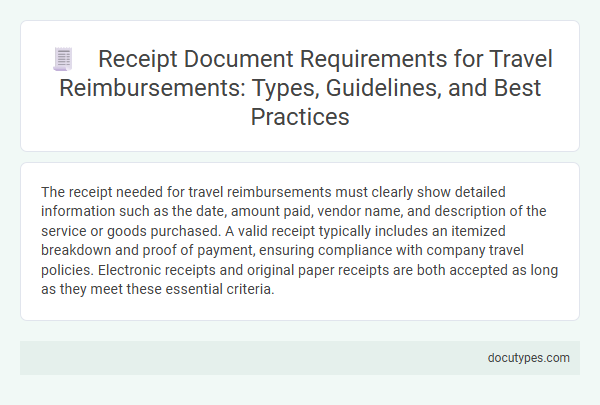The receipt needed for travel reimbursements must clearly show detailed information such as the date, amount paid, vendor name, and description of the service or goods purchased. A valid receipt typically includes an itemized breakdown and proof of payment, ensuring compliance with company travel policies. Electronic receipts and original paper receipts are both accepted as long as they meet these essential criteria.
Understanding Receipt Requirements for Travel Reimbursements
Understanding receipt requirements for travel reimbursements is essential to ensure that expenses are properly documented and approved. Accurate receipts serve as proof of payment and help organizations verify eligible travel costs.
Receipts must clearly show the date of purchase, vendor name, and the amount paid to qualify for reimbursement. Itemized receipts are often required to distinguish between reimbursable travel expenses and non-reimbursable items. Without proper documentation, reimbursement claims may be delayed or denied.
Essential Types of Receipts for Travel Claims
Receipts play a crucial role in travel reimbursements by providing proof of expenses incurred during your trip. Essential types of receipts include transportation tickets, hotel invoices, and meal bills, each detailing dates, amounts, and service providers. Proper documentation ensures accurate processing and compliance with company travel policies.
Key Information Every Travel Receipt Should Include
Receipts are essential for travel reimbursements as they provide proof of expenditures. Knowing which receipt document to submit ensures smooth processing of your travel claims.
- Date of Purchase - The receipt must clearly display the date when the transaction occurred to verify the timing of the expense.
- Vendor Information - Include the name and contact details of the service provider or retailer for authenticity and verification purposes.
- Itemized Description - Detailed listing of purchased items or services on the receipt helps justify the reimbursement request.
Acceptable vs. Unacceptable Receipt Formats
Travel reimbursements require specific receipt documents to validate expenses incurred during trips. Acceptable receipts must clearly display the vendor's name, date of purchase, detailed itemization, and the amount paid.
Receipts in digital or printed formats are generally accepted if they meet these criteria. Unacceptable receipts include handwritten notes, credit card statements without itemization, or vague invoices lacking essential details.
Guidelines for Digitizing and Submitting Receipts
For travel reimbursements, the required receipt document must clearly detail the date, vendor, items purchased, and total amount paid. Guidelines for digitizing receipts emphasize capturing high-resolution images that are legible and complete, avoiding cuts or shadows. Submit scanned receipts in accepted formats such as PDF or JPEG through designated reimbursement platforms to ensure prompt processing.
Common Mistakes to Avoid in Travel Receipt Documentation
| Common Mistakes to Avoid in Travel Receipt Documentation |
|---|
|
Incomplete Receipts: Receipts missing key details such as date, vendor name, and transaction amount often lead to reimbursement delays. Ensure each receipt clearly shows these essential elements. Unclear or Illegible Copies: Submitting blurry or faded receipts can cause confusion during expense verification. Use clear scans or photocopies of original receipts. Missing Original Receipts: Photocopies or handwritten notes without the original receipt might be rejected. Always provide original receipts unless digital copies are specifically accepted. Lack of Itemization: Receipts displaying just a total amount instead of detailed itemization can complicate approval when specific expenses need to be verified. Non-Compliance with Policy: Using receipts that do not match travel reimbursement policies, like personal expenses or unsupported items, will result in claim denial. Missing Currency Specification: Receipts without a clear currency indicator might cause inaccurate reimbursement calculations, especially for international travel. Expired Timeframes: Submitting receipts beyond the allowable submission period specified by the travel policy can invalidate claims. Your travel reimbursements depend on providing accurate, complete, and policy-compliant receipts for smooth processing. |
Handling Lost or Missing Receipts: Procedures and Solutions
Travel reimbursements require specific receipts to validate expenses for transportation, lodging, and meals. Lost or missing receipts can delay reimbursement but there are established procedures to address these issues efficiently.
- Original Receipts Are Essential - Airlines, hotels, and dining receipts must show the date, vendor, and amount spent to qualify for reimbursement.
- Submit a Lost Receipt Affidavit - Many organizations accept a signed affidavit explaining the loss and confirming the expense details when the original receipt is unavailable.
- Use Credit Card Statements as Proof - Credit or debit card statements can sometimes substitute missing receipts if they clearly indicate the transaction related to travel expenses.
Special Cases: International Travel Receipts and Currency Conversion
Travel reimbursements require specific receipt documents to validate expenses. Special cases like international travel receipts and currency conversion demand extra attention for accuracy and compliance.
- International Travel Receipts - Must include detailed information such as date, vendor, and service description to ensure legitimacy.
- Currency Conversion Documentation - Requires official exchange rates or bank statements to reflect accurate reimbursement amounts.
- Compliance with Policies - Receipts must align with your organization's travel reimbursement guidelines for approval.
Your careful submission of these receipts facilitates smooth and timely reimbursement processing.
Auditing and Compliance: Ensuring Receipt Validation
Which receipt document is needed for travel reimbursements to ensure auditing and compliance? A valid receipt must include detailed information such as the vendor's name, date of purchase, and itemized expenses. Proper receipt validation helps organizations maintain accuracy and transparency in their reimbursement processes.
Which Receipt Document Is Needed for Travel Reimbursements? Infographic

